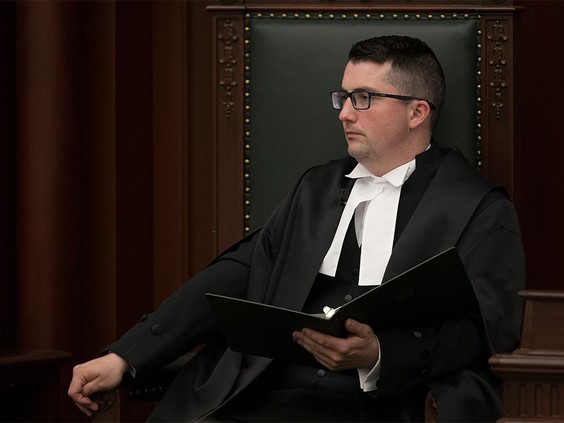Ashley Joannou
October 1, 2021
-Edmonton Journal
Alberta’s Speaker of the legislature says he does not have the power to unilaterally impose a vaccine mandate on MLAs in the legislature but that the elected officials could vote to create one he would be responsible for enforcing.
Questions around the vaccination status of those in the legislature come as the NDP pushes for vaccine rules in the building and calls for Premier Jason Kenney to boot out unvaccinated MLAs from his caucus.
In an interview with Postmedia Friday, Speaker Nathan Cooper said he doesn’t create the rules such as how MLAs dress or behave while sitting in the chamber but is responsible for making sure people follow rules that are in place.
“Is it possible for the assembly, who is a master of its own domain, to pass a motion or a temporary standing order or a permanent standing order that would say, require a vaccination or a rapid test in order to enter the chamber? Yes, they can,” he said.
“At present, there is nothing in our rules that would require that, and the Speaker can’t unilaterally make up rules.”
Earlier this week, the NDP requested a meeting of the member services committee to implement a requirement that all MLAs and staffers be vaccinated.
The Opposition says anyone not vaccinated should not be allowed in, and MLAs and employees who refuse to provide proof of vaccination would be subject to leave without pay.
The committee can only make recommendations, Cooper said, but the assembly itself would have to vote to create the formal rule.
The NDP is also pushing Kenney to follow Ontario and Saskatchewan where unvaccinated MLAs have been told they have to leave the government caucus to sit as independents.
“It’s time to send a very clear message that if you refuse to be vaccinated, there’s no place for you in the government caucus,” NDP deputy house leader Thomas Dang said Friday, adding that all 24 NDP MLAs and all 30 staff have been vaccinated.
In a statement Friday, Kenney’s acting press secretary Harrison Fleming said “the government house leader is working with the legislative assembly to ensure that this fall’s session can take place safely,” but didn’t answer questions around whether Kenney would be willing to kick unvaccinated MLAs out of caucus or how many UCP MLAs are currently vaccinated.
On Thursday, Kenney said the government was looking into mandatory vaccinations or proof of negative tests for all MLAs and staff, but added there are constitutional issues that must be worked out.
“It’s a long-standing legal principle that you can’t prohibit an elected member from entering the chamber,” Kenney said.
Eric Adams, vice dean of the facility of law at the University of Alberta, said the legislature is subject to parliamentary privilege which gives it the ability to define its own rules and procedures that courts cannot interfere with.
“I don’t think it’s the case that rules and procedures designed to keep the legislative space safe and in accordance with broader public health rules could be seen as undermining democracy in a way that would have any kind of constitutional weight or merit,” he said.
Robert Hawkes, a partner at the Calgary law firm JSS Barristers, said human rights law protects an MLA with a legitimate reason that they could not get vaccinated and that MLAs also can’t be blocked from representing their constituents.
In both cases, he said, any mandate could still go ahead if it provided for some form of reasonable accommodations such as appearing via Zoom or agreeing to keep those who are unvaccinated separate from others.
“You can be raising these human rights and Charter issues and parliamentary privilege issues and still believe that society would be better off if we all got vaccinated,” he said.
Meanwhile, Cooper says discussions are underway regarding whether the legislature and Federal Building will be subject to the province’s vaccine passport program requiring proof of vaccination or a recent negative COVID-19 test for members of the general public to attend.
The justice and infrastructure departments, Sheriffs’ office and Speaker’s office all control different components of the buildings.
Cooper said the discussions include whether the ability to visit the buildings qualifies as “essential,” therefore exempting them from the passport program.




